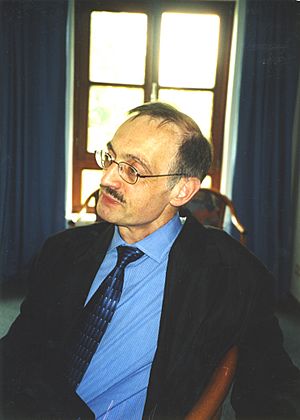Alf Lüdtke facts for kids
Alf Lüdtke (born October 18, 1943, in Dresden – died January 29, 2019) was a German historian. He was a leading expert in a special way of studying history called the history of everyday life (known as Alltagsgeschichte in German). He was interested in how people lived their daily lives, especially how work shaped society. He also studied how people acted and reacted in dictatorships and how societies remembered wars and terrible events like genocide.
Contents
Life and Work
Starting a New Kind of History
Alf Lüdtke, along with another historian named Hans Medick, helped start Alltagsgeschichte. This means "history of everyday life." It's a type of microhistory, which focuses on small details to understand bigger historical events. This approach was very popular among German historians in the 1980s.
His Studies and Early Research
Lüdtke studied history, sociology, and philosophy at the University of Tübingen from 1965 to 1972. He earned his master's degree in 1974. In 1980, he completed his doctorate at the University of Konstanz. His main research for his doctorate looked at how the government used force in Prussia in the early 1800s.
One of his articles, published in 1979, talked about how state power was used during the shift from the old feudal system to capitalist society. He believed that the government used force to control the working class in Prussia. This prepared them for the new ways of working under capitalism. Lüdtke was very interested in how the government and capitalism grew together.
Teaching and Research Positions
In 1988, Alf Lüdtke completed a higher degree that allowed him to teach as a professor. He then taught history at the University of Hannover from 1989 to 1999. In 1995, he became a special professor there. In 1999, he became a full professor at the University of Erfurt. From 2008, he was an honorary professor for historical anthropology at Erfurt. Historical anthropology is a field that studies humans and their cultures through history.
Since 1975, Lüdtke also worked at the Max Planck Institute for History in Göttingen. This is a famous research center for history. In 1999, he and Hans Medick started a special department there for historical anthropology at the University of Erfurt.
International Connections
From the 1980s, Lüdtke had regular connections with historians in France and the USA. He was often a guest professor at the University of Michigan and the University of Chicago in the 1990s. Later, he also built strong connections with South Korea. From 2005, he took part in conferences about mass dictatorships in Seoul. He also led seminars and workshops in South Korea from 2008 to 2013.
Later Research and Publications
In his later years, Lüdtke was part of research groups studying time and space, and work and life cycles. He also started and edited several academic journals. These journals included Sozialwissenschaftliche Informationen, Werkstatt Geschichte, and Historische Anthropologie. Kultur – Gesellschaft – Alltag.
Alf Lüdtke brought together ideas from sociology, ethnology (the study of cultures), and anthropology with history. His work on the daily lives of factory workers and "ordinary" people greatly influenced historical studies around the world. His last research projects looked at border checkpoints in East Germany, war as a form of work, and how history is studied across different countries.
Selected Works
Alf Lüdtke wrote and edited many important books and articles. These works explored his main interests, such as:
- How governments used power and violence in the past.
- The daily lives and experiences of workers in factories, especially in Germany during the early 20th century and under dictatorships.
- How people remembered and dealt with major historical events like wars and genocide.
- The role of symbols and everyday actions in shaping society and politics.
He also edited collections of essays that brought together different historical perspectives on topics like physical violence and the history of everyday life.
See also
 In Spanish: Alf Lüdtke para niños
In Spanish: Alf Lüdtke para niños
 | Audre Lorde |
 | John Berry Meachum |
 | Ferdinand Lee Barnett |


